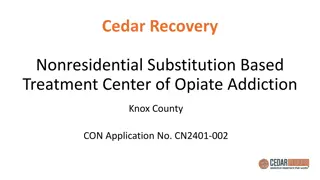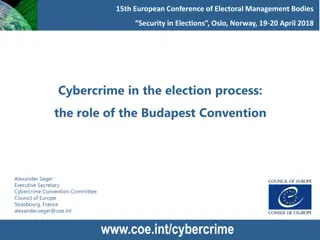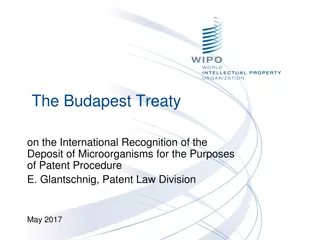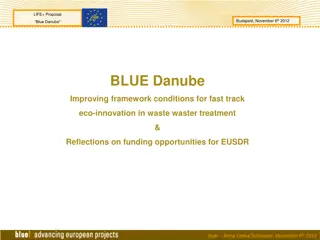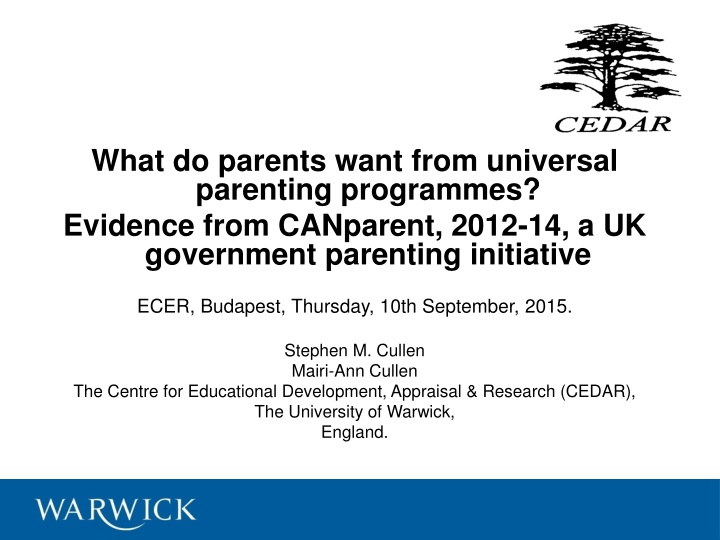
Parents' Needs in Universal Parenting Programs: Insights from CANparent Initiative
Gain insights into parents' expectations from universal parenting programs through the CANparent initiative, detailing findings from the 2012-2014 trial in the UK. Understand parents' engagement with parenting classes, decision-making processes, and impacts on parenting skills and confidence.
Download Presentation

Please find below an Image/Link to download the presentation.
The content on the website is provided AS IS for your information and personal use only. It may not be sold, licensed, or shared on other websites without obtaining consent from the author. If you encounter any issues during the download, it is possible that the publisher has removed the file from their server.
You are allowed to download the files provided on this website for personal or commercial use, subject to the condition that they are used lawfully. All files are the property of their respective owners.
The content on the website is provided AS IS for your information and personal use only. It may not be sold, licensed, or shared on other websites without obtaining consent from the author.
E N D
Presentation Transcript
What do parents want from universal parenting programmes? Evidence from CANparent, 2012-14, a UK government parenting initiative ECER, Budapest, Thursday, 10th September, 2015. Stephen M. Cullen Mairi-Ann Cullen The Centre for Educational Development, Appraisal & Research (CEDAR), The University of Warwick, England.
Overview The CANparent trial, 2012-2014. Follow-up interviews with participating parents (n=50): what do they show about parents engagement with parenting classes: Finding out about, and choosing between classes Deciding to attend a class What facilitated attending a class Survey of parents (n=675) who undertook a CANparent class: how does this data support the interview data? Conclusions.
The CANparent trial, 2012-2014 It was a UK government trial (under the auspices of the Department for Education DfE) of the market potential for universal parenting classes to support parents of 0-5 year old children In 3 English areas Camden, Middlesbrough, High Peak use of vouchers was trialled to stimulate supply & demand in respect of universal parenting All parents in those areas were entitled to a voucher worth 100 (c. 137) for a CANparent class. The class providers received 75 for each parent recruited & another 25 on parents completion of the class.
Aims of the CANparent trial A trial of a universal offer of high-quality, stigma-free parenting classes to support parenting skills & confidence To stimulate the development of a commercial market in parenting provision To reduce the need for costly interventions later on (i.e., an early intervention approach).
The follow-up interviews Between March & November 2013, 50 follow-up interviews carried out with participating parents A stratified random sample of 45 parents who had completed a course & 5 who started but did not finish a course The parents covered all the voucher areas, and 12 of the 14 providers; 4 were men & 46 women Analysis of the interviews (45 recorded & 5 notes only) done by collating all responses under themes derived from the semi-structured interview schedule.
Finding out about the classes The trial was, in part, an attempt to introduce marketised elements into parenting provision parent choice was seen to be important The parent interview data showed that the most common source of information for the parents came via universal public services related to children, e.g., schools, nurseries, children s centres, libraries The next most common source was health visitors, or social workers.
Choosing between the classes Only a minority of the parents made an active choice that is, researched different classes & chose between them taking into account their own needs The majority of parents: Attended the first course they heard about Attended a course at a place they already used Went to a course recommended to them by a trusted professional Went with a friend to a course chosen by the friend. /
Choosing between classes (ii) I found out about the course through my children s school, where it was held, and then found out I needed a voucher and was told where to go to get it . (Parent 29) One of the workers at the Children s Centre recommended doing the group . (Parent 30) My friend picked up the leaflet in a Boot s store where we live, and she rang me and said, do you fancy coming along? That s how I got to know about it . (Parent 33)
What motivated parents to attend? Whether or not parents made an active choice, they were still motivated to attend. The motivations included: To help communicate better with my child To learn about parenting in a group, not just from a book As a first time mother needed basic information To get out of the house & talk to other people To get professional information, not just information from own family To get help with losing my temper with my children To help with bedtime & tantrum problems To support a court case over access to my child.
What facilitated attendance? Individual motivation was, in itself, not enough to ensure attendance at a class. Other factors also facilitated, and, in fact, determined attendance at particular classes These factors can be grouped under two additional headings: 1. Attractions of the course 2. Attractions of the hosting arrangements.
1. Attractions of the course Provider organisation was known to the parent, or had a good reputation Provider responded quickly to initial contact from parents Class was free (as part of CANparent. After that, parents would be interested if free or affordable ) Class content was interesting Class promoted by staff of a familiar organisation like school, nursery, children s centre, or by trusted friend or professional.
2. Attractions of the hosting arrangements The venue was familiar (children s centre, school, church) Venue was local & convenient Time of class was convenient Childcare was offered, could be arranged, or was not an issue Course facilitator/s spoke same language as parent.
Parents views: survey In addition to the interviews, a participating parents survey was carried out when parents started a class (a pre & post class survey) 675 participating parents completed outcome evaluation questionnaires at the start of a class, with 378 completing post- class questionnaires (44% loss to follow up rates, but only 2% of the parents overall failed to complete their class) The questionnaires used standardized tests (Being A Parent BAP, Warwick & Edinburgh Mental Well-Being Survey WEMBS, & Parenting Daily Hassles PDH) to establish outcomes and change. The data from the survey provide some supporting evidence to the parent interviews/ .
Parents views: survey (ii) The survey provides data relating to the stress, confidence levels & mental well-being of parents The findings reflect the personal motivation behind parents decision to take a class Compared to the randomly selected, population- representative group of parents with a similar demographic profile: CANparent participants appeared to experience more parenting stress, less confidence in their parenting ability, less satisfaction from parenting & less mental well-being overall.
Conclusions Parents were attracted by a mix of practical and personal motivations: Mediated choice; with trusted intermediaries Personal motivation, including higher levels of stress, sense of parenting problems, mental well-being Practical issues; location, childcare, timing etc.
Relevant reports & journal articles (i) Cullen, Stephen Michael, Cullen, Mairi Ann and Lindsay, Geoff. (2015) Universal parenting programme provision in England : barriers to parent engagement in the CANparent trial, 2012- 2014. Children & Society . ISSN 0951-0605 doi: http://dx.doi.org/10.1111/chso.12120 (In Press) Early view: http://onlinelibrary.wiley.com/doi/10.1111/chso.12120/abstract Cullen, Stephen Michael, Cullen, Mairi Ann, & Lindsay, Geoff, The CANparent Trial in England, 2012-2014 challenges in using a quasi- market approach to build a market in universal parenting education provision in England: under review by the Journal of Education Policy.
Relevant reports & journal articles (ii) CANparent trial evaluation: final report (Geoff Lindsay, Mairi Ann Cullen, Stephen Cullen, Vaso Totsika, Ioanna Bakopoulou, Susan Goodlad, Richard Brind, Emily Pickering, Caroline Bryson, Susan Purdon, Gavan Conlon, Iris Mantovani), Department for Education, July, 2014, Ref: DFE- RR357: https://www.gov.uk/government/publications/canparent-trial-evaluation-final-report CANparent trial evaluation: final report brief (Geoff Lindsay, Mairi Ann Cullen, Stephen Cullen, Vaso Totsika, Ioanna Bakopoulou, Susan Goodlad, Richard Brind, Emily Pickering, Caroline Bryson, Susan Purdon, Gavan Conlon, Iris Mantovani), Department for Education, July, 2014, https://www.gov.uk/government/uploads/system/uploads/attachment_data/file/332184/RB357_- _CANparent_trial_evaluation_final_report__Research_Brief_08_07_14.pdf (8 pp). CANparent Trial Evaluation: Second Interim Report, (M-A. Cullen, S. Cullen, S. Strand, & G. Lindsay), Department for Education, Research Report DFE-RR317, ISBN: 978-1-78105-288-4, January, 2014: https://www.gov.uk/government/publications/canparent-trial-evaluation-second-interim-report CANparent Trial Evaluation: First Interim Report, (M-A Cullen, S. Cullen, S. Strand, I. Bakopoulou, G. Lindsay, R. Brind, E. Pickering, C. Bryson, & S. Purdon), Department for Education, Research Report DFE-RR280, ISBN: 978-1-78105-223-5, March 2013: https://www.gov.uk/government/publications/canparent-trial-evaluation-first-interim-report

